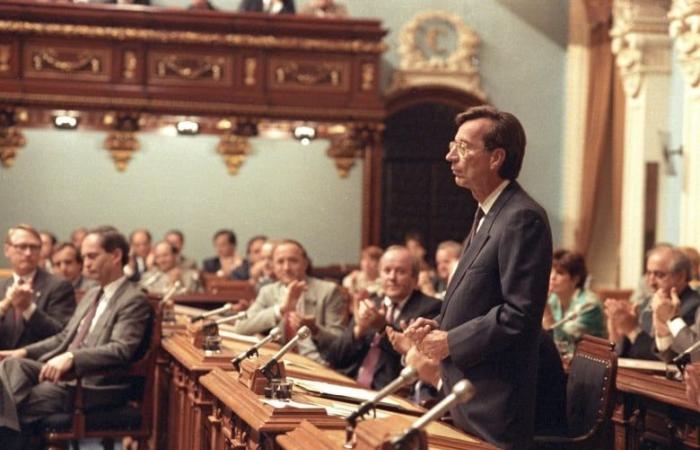Arabnews24.ca:Wednesday 28 September 2022 04:05 AM: In the last provincial election, Quebec's Liberal Party suffered its worst defeat in its 151-year history. Even the most optimistic projections suggest the party will fare even worse when the votes are tallied on Monday.
Recent polls place Liberal support between 15 and 20 per cent, battling three other parties for second place. Before 2018, the Liberals had never received less than 30 per cent of the vote.
The party still stands a decent chance of holding onto Official Opposition status, thanks to remaining strongholds on the island of Montreal.
But with little prospect of making inroads in majority francophone ridings, this would be cold comfort for a party that has dominated modern Quebec political history.
While it is possible to rattle off a long list of factors that contributed to its decline — lingering memories of corruption, unpopularity of austerity governments, a political spectrum crowded by newcomers — it is perhaps simpler to say the Quebec Liberals haven't been able to keep pace with the conservative nationalism of the Coalition Avenir Québec (CAQ).

Since Confederation, the Liberals had been the main champion of liberal values in Quebec, channeling beliefs about the importance of private property and individual rights into government policies.
Liberal governments were behind the push for a more secular education system at the dawn of the 20th century, gave women the right to vote during the Second World War and brought in a provincial charter of human rights in 1975.
A diminished party means liberal values face an uncertain future in the province.
Not only does the CAQ look set to consolidate its hold on government, Liberals (and liberals) must contend with an ideologically diverse opposition that is trying to sweep them into the dustbin of history.
The rise of Quebec liberalism
After Confederation, there were effectively two parties in the province, the Liberals and the Conservatives.
The Liberals represented a more moderate version of the radical anticlerical rouge party of the pre-Confederation years. It was the Conservatives, though, inheritors of the pro-Catholic Church bleu tradition, who held the upper hand for most of the late 19th century.
Buoyed by the popularity of Wilfrid Laurier, the French-Canadian Liberal prime minister, the Quebec Liberals won the 1897 election and began a nearly four decade-long hold on power.
Historians often attribute this success to the party's embrace of economic development and material progress.
Whereas the Conservatives advocated for agricultural traditions, the Liberals encouraged industrialization by providing incentives to foreign companies to set up factories in the province.
The Liberals of Lomer Gouin and Louis-Alexandre Taschereau also sought to modernize the education system. But they were cautious not to extend to remit of the state too much; society was still considered the domain of the church.
The Liberals finally lost power in 1936 to the Union National, a new and fervently conservative party led by Maurice Duplessis.
While in opposition, the party overhauled its platform to include the interventionist ideas advocated by the British economist John Maynard Keynes.

It came to see the state as a powerful tool to further the modernization of the province and address social inequalities, chief among them being the marginal role francophones played in the Quebec business world.
The Duplessis-era came to an end in 1960, when Jean Lesage led an unruly coalition of liberals and moderate nationalists to power, kick-starting what became known as the Quiet Revolution.
Under the slogan Maîtres chez nous ("Masters in our own home"), the Lesage government undertook a dizzying array of reforms, including legal protections for unionized workers, ending the church's role in the education system and nationalizing nearly a dozen electricity companies.
Arguably, though, the crowning achievement of Quebec liberalism didn't come until 1975, when the Quebec Charter of Human Rights and Freedoms was passed unanimously by the Liberal government of Robert Bourassa.
The charter, the product of a 12-year effort, protects a wide range of political, economic and social rights. Both the Parti Québécois and the Liberals saw it as a necessary set of limits on the power of the state, which had just grown dramatically in size.
The fall of Quebec liberalism
In the 1980s, with the province facing another economic crisis, liberalism shed its statist bent. Bourassa, in his second stint as premier, privatized several state entities that had been set up during the Quiet Revolution.
This pro-business, more managerial approach to liberalism was a central feature of the party's defence against the separatist sentiment that swelled after the failures of the Meech Lake and Charlottetown accords.
Sound economic management was contrasted with the adventure of independence from Canada. It proved a winning argument. Aside from an 18-month period, the Liberals remained in power between 2003 and 2018.
But if neo-liberalism proved an effective strategy against sovereignty, it has failed to soothe the anxieties about identity and immigration that surfaced in the mid-2000s and have remained a fixture of Quebec politics ever since.
A revived conservative nationalist movement, led by François Legault and the CAQ, argues that liberalism exacerbates anxieties about identity by prioritizing individual and minority rights ahead of the collective rights of the francophone majority.

This is how his government justifies using the notwithstanding clause to protect the Laicity Act — a.k.a. Bill 21, which bans many civil servants from wearing religious symbols — and his new language law (Bill 96) from charter challenges.
Notably, Legault has invoked the notwithstanding clause in not only the federal charter of rights, but the provincial one as well, signalling a clear break with Quebec's liberal tradition.
In a debate last week, the current Liberal leader, Dominique Anglade, mounted a passionate defence of her opposition to Legault's two flagship pieces of legislation, both of which are popular with voters.
"We were the only party to vote against Bill 96 and Bill 21 because of a question of values," she said.
A poll released on Tuesday suggested she lost the debate, with only six per cent of voters picking her as the winner.
Throughout its history, the Quebec Liberal Party has been able to adapt its brand of liberalism to confront whoever its main rival happened to be, be it conservative nationalists or social-democratic sovereigntists.
But now liberalism is no longer one of only two options on the menu.
On Monday, voters in Quebec can choose between the progressive sovereigntist politics of Québec Solidaire, the PQ's mix of conservative identity politics and left-wing economic policies and the conspiracy-minded libertarianism of Eric Duhaime's Conservatives.
The future of liberal politics in Quebec depends on Anglade making a long familiar ideology stand out in a field crowded with newcomers.






